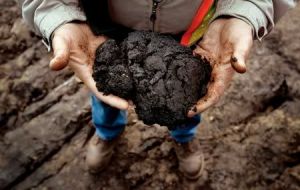MercoPress. South Atlantic News Agency
China buys into Canada’s tar sands; Angola signs oilfield deals with Iraq
 Oil sands are still a developing technology which needs high crude prices to be profitable
Oil sands are still a developing technology which needs high crude prices to be profitable Canada's Industry Minister, Tony Clement, has given PetroChina the go-ahead for a 1.7 billion US dollars acquisition of two oil sand projects.
The deal gives the Chinese company 60% control of Athabasca Oil Sands Corporation's MacKay and Dover oil sands deposits in Alberta province. The two are projected to yield five million barrels of oil, according to the company.
The sands contain the second-biggest store of oil in the world.
They are estimated to hold 175 billion barrels of oil. Only Saudi Arabia holds more. But it is tricky - and costly - to extract oil from such sands.
Only in the past few years has the price of oil been high enough to make it worthwhile. It is currently just short of 80 a barrel.
Canada's industry minister, Tony Clement, said: “I am satisfied that the investment is likely to be of net benefit to Canada.”
He said the Chinese company made a commitment to contribute more than 250 million to cover its share of developing the oil sand projects over the next three years, as well as boosting employment and managing a regional office in the area for a period of five years. The deal was originally agreed two months ago.
In related news from Iraq it was announced that the Angolan state-owned oil company, Sonangol, has signed two initial oilfield deals. The two, the Qayara and Najmah oilfields, are in Nineveh province, known as one of the most dangerous regions of the country.
Sonangol will be paid between $5 and $6 a barrel, one of the highest fees awarded in Iraq's oil deals. The two fields combined contain an estimated 1.7 billion barrels of oil.
The deals were awarded in Iraq's second bidding round for oil contracts, held earlier this month. Contracts went to companies including Shell, CNPC and Lukoil.
The high fees for Sonangol reflect the risks and relatively low quality of oil at the two sites. But they were well below what the company initially pitched for. The firm had proposed fees of between 8.50 and 12.50 US dollars a barrel.
Sonangol has said it will invest 2 billion in Qayara and that several firms have shown an interest in forging joint exploration partnerships with it.
“There are at least five companies that have approached us and showed an interest to work with us to invest. We are still holding talks with them. The companies are European and American,” said Paulino Jeronimo, exploration manager at Sonangol.
Iraq’s proven reserves now stand at 115 billion barrels, below Iran's 137 billion and Saudi Arabia's 264 billion. But Iraq's data dates from the 1970s. Angola is Africa's second most oil-rich nation after Nigeria.




Top Comments
Disclaimer & comment rulesCommenting for this story is now closed.
If you have a Facebook account, become a fan and comment on our Facebook Page!